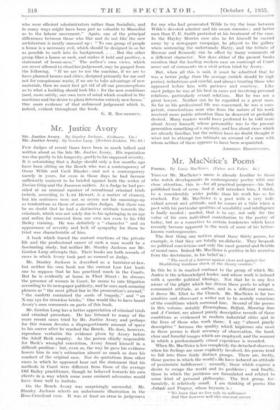Mr. Justice Avory
FEW Judges of recent times have been so much talked and written about as the late Mr. Justice Avory. His reputation was due partly to his longevity, partly to his supposed severity. It is astonishing that a Judge should only a few months ago have been sitting on the Bench who was a contemporary of Oscar Wilde and Cecil Rhodes—and not a contemporary merely in years, for even in those days he had become sufficiently eminent to be briefed against both the writer of Dorian &ay and the Jameson raiders. As a Judge he had pre- sided at an unusual number of sensational criminal trials (which, according to Lord Hewart, is a matter of chance), but his sentences were not so severe nor his summings-up so tendentious as those of some other Judges. But there can be no doubt that he had a distinctive attitude towards the criminals, which was not solely due to his upbringing in an age and milieu far removed from our own nor even to his Old Bailey training. He was definitely a " character " and an appearance of severity and lack of sympathy for those he tried was characteristic of him.
A book which traced the mutual reactions of the private life and the professional career of such a man would be a fascinating study, but neither Mr. Stanley Jackson nor Mr. Gordon Lang attempts this. Their books are both records of cases in which Avory took part as counsel or Judge.
Mr. Stanley Jackson is described as a barrister-at-law, but neither his own book nor the current Law List leads one to suppose that he has practised much in the Courts. But he is evidently at home in Fleet Street : he stresses the presence of women in Court, he seems to rate litigation according to its newspaper publicity, and he uses such amazing phrases as " the most gifted liar in the prosecution's arsenal," " the confetti contained the seeds of tragedy," and " an X-ray eye for strawless bricks." One would like to have heard Avory's own comments on parts of this book.
Mr. Gordon Lang has a better appreciation of criminal trials and criminal procedure. He has listened to many of the more recent cases tried by Mr. Justice Avory and perhaps for this reason devotes a disproportionate amount of space to his career after he reached the Bench. He does, however, reproduce verbatim the evidence given by Avory before the Adolf Beck enquiry. As the person chiefly- responsible for Beck's wrongful conviction, Avery found himself in a difficult position : but, even so, the way he gave his evidence lowers him in one's estimation almost as much as does his conduct of the original case. Nor do quotations from other cases in which he appeared bear out, the statement that his methods in Court were different from those of the average Old Bailey practitioner, though he behaved towards his own clients in ft, way which some more eminent advocates would have done well to imitate.
On the Bench Avory was surprisingly successful. Mr. Stanley Jackson selects an unfortunate illustration in the ltoss-Crossland ease. It was at least an error in judgement for one who had prosecuted Wilde to try the issue between Wilde's devoted admirer and his sworn enemies ; and better men than F. E. Smith protested at his treatment of the case. In the HaYley Morriss case also he let himself be carried away by a newspaper campaign, he played to the gallery when sentencing the unfortunate Hatry, and the tribute of Browne and Kennedy can be offset by many comments of a different character. Nor does either of the present 'books mention that the leading modern case on contempt of Court arose out of comments on a civil action tried by Avory.
But, when all this is said, it must be admitted that he was a better judge than 'the average (which should be high
praise), industrious and careful, and always treating those who appeared before him with patience and courtesy. Like most judges he was at his best in cases not involving personal relations, particularly sexual relations. But lie was not a great lawyer. Neither can he be regarded as a great man. So far as his professional life was concerned, lie was a com- petent, conscientious man who from the nature of his .work received more public attention than he deserved or probably desired. Many readers would have preferred to be told more about Avory himself, whose personality was to the present generation something of a mystery, and less about Cases which are already familiar, but the:writers have no doubt thought it wiser not to attempt too intimate an account of a man. with whom neither of them appears to have been acquainted..
Ammon; HOOPINC1TON.










































 Previous page
Previous page